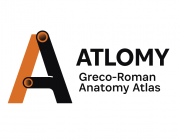
 Marco Vespa is PhD in Classics and currently research fellow at the Hebrew University of Jerusalem where he is part of the ERC project Atlomy. Until 2021 he was a researcher in the ERC project Locus ludi on play culture in the ancient world at the University of Fribourg (CH). His research interests include ancient zoology and medicine, the Second Sophistic, ancient Greek comic theatre, as well as the transmission and the cultural study of Greek scientific texts and ideas. He is also a member of several scientific programs and research groups such as Zoomathia (Cultural Transmission of Zoological Knowledge in Antiquity and Middle Ages), Parsa (Pôle alpin de recherche sur les sociétés antiques) and ETYGRAM (Ancient and Medieval Greek Etymologies). He has extensively published on ancient zoology and the cultural representation of animals in the Greek and Roman worlds (especially on cocks, dolphins, cranes, elephants, and non-human primates). His monographic study on the monkey in ancient Greek and Graeco-Roman literature and culture has recently been published (2021, for the Brepols series Antiquité et Sciences Humaines, n. 7).
Marco Vespa is PhD in Classics and currently research fellow at the Hebrew University of Jerusalem where he is part of the ERC project Atlomy. Until 2021 he was a researcher in the ERC project Locus ludi on play culture in the ancient world at the University of Fribourg (CH). His research interests include ancient zoology and medicine, the Second Sophistic, ancient Greek comic theatre, as well as the transmission and the cultural study of Greek scientific texts and ideas. He is also a member of several scientific programs and research groups such as Zoomathia (Cultural Transmission of Zoological Knowledge in Antiquity and Middle Ages), Parsa (Pôle alpin de recherche sur les sociétés antiques) and ETYGRAM (Ancient and Medieval Greek Etymologies). He has extensively published on ancient zoology and the cultural representation of animals in the Greek and Roman worlds (especially on cocks, dolphins, cranes, elephants, and non-human primates). His monographic study on the monkey in ancient Greek and Graeco-Roman literature and culture has recently been published (2021, for the Brepols series Antiquité et Sciences Humaines, n. 7).
Publications
Books
Geloion Mimēma. Studi sulla rappresentazione culturale della scimmia nei testi greci e greco-romani, Turnhout, Brepols, (collection ‘Antiquité et Sciences humaines’; n. 7), 2021.
DOI: 10.1484/M.ASH-EB.5.124755
Edited volumes or journal issues
- (with Véronique Dasen) Play and Games in Classical Antiquity: Definition, Transmission, Reception / Jouer dans l’Antiquité classique. Définition, transmission, réception, Liège, Presses universitaires de Liège, (collection ‘Jeu/Play/Spiel’; n. 2), 2021.
- (with Arnaud Zucker) Élien en contexte : rhétorique, pratique de l’argumentation et savoir naturaliste, special issue in Philologia antiqua. An International Journal of Classics, vol. 13, 2020.
- (with Véronique Dasen) Bons ou mauvais jeux ? Pratiques ludiques et sociabilité, special issue in Pallas, 114.3, 2020.
Articles in peer-reviewed journals (selection)
- “Knucklebone Faces and Throws. Play, Rules, and Rhetorical Discourse in Julius Pollux”, Mnemosyne, 75, 2022, in press. DOI: https://doi.org/10.1163/1568525X-BJA10034
- “Fin de partie. Les larmes des éléphants et la rupture du pacte ludique chez Pline, Histoire naturelle, VIII, 20-21”, Kentron, 36, 2021, 157-182.
- (with Arnaud Zucker) “Imiter ou communiquer. L’intention du singe dans la littérature gréco-romaine”, Mètis, n.s. 18, 2020, 233-250.
- “Les effets néfastes de la kubeia. Mise en jeu du prestige et de l’image sociale en Grèce classique”, Pallas, 114.3, 2020, 173-192.
- “Considerazioni sullo zoonimo ΚΑΣΤΩΡ nel Papiro di Artemidoro (V6 Gallazzi-Kramer-Settis)”, Archiv für Papyrusforschung und verwandte Gebiete, 60.1, 2020, 1-10. DOI: https://doi.org/10.1515/apf-2020-0001
- “Ierocle Stoico, i castori e l’Egitto. L’etnozoologia e la ricerca filologica: un caso di studio”, Studi Italiani di Filologia Classica, IV ser., 17.2, 2019, 273-294.
- “A Voice without a Muse: Primates and the Ancient Phonosphere in Greek and Roman Cultures”, Greek and Roman Musical Studies, 5.2, 2017, 159-177.
Articles in peer-reviewed collective volumes (selection)
- “Animal metaphors and metadrama. A cultural insight into the verb πιθηκίζειν”, in E. Paillard, S. Milanezi (eds.), Theatre and Metatheatre. Definitions, Problems, Limits, Berlin, de Gruyter (Series ‘MythosEikonPoiesis’; n. 11), 2021, 193-211. DOI: 10.1515/9783110716559-010
- “Presentifying the Divine in Ancient Greek Tales: Human Voices in Animal Bodies” in H. Schmalzgruber (ed.), Speaking Animals in Ancient Literature, Winter Verlag, Heidelberg, 2020, 401-425.
- “La sagesse de Palamède : les dés, les pions et l’établissement d’un ordre (à propos de Philostrate, Sur les héros, 10 Follet) » in V. Dasen, D. Bouvier (eds.), Héraclite : le temps est un enfant qui joue, Liège, Presses Universitaires de Liège (collection ‘Jeu/Play/Spiel’; n. 1), 2020, 75-94.
- “Physiologein: dinamiche enunciative e usi del testo omerico nel corpus zoologico di Aristotele”, in E. Berardi, M.-P. Castiglioni, M.-L. Desclos, P. Dolcetti (eds.), Aristotele citatore / Aristote citateur ou la réappropriation par la philosophie des discours de savoir antérieurs, Alessandria, Edizioni dell’Orso, 2020, 401-422.


